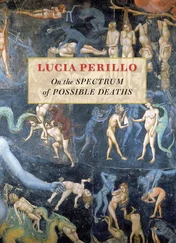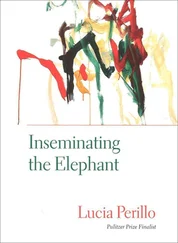Of course, there were also the strange clown-faced scoters, and the cormorants that unfurl their iridescent blue wings in the sunlight and stay poised that way as if they were fashioned out of metal. At home, I was medicating my wife far beyond what was deemed reasonable five years ago. Pain was the medium in which she floated, no cure for that, but still I was determined to glaze its jagged surface. Sometimes she giggled and grabbed at lights that flashed before her eyes, her eyes that glittered like the glittering eyes of birds that do not speak of these same things that we let go unsaid.
In those difficult months Yvonne Beauchemin tried to be the good neighbor, though her help was often inappropriate. The casseroles she brought to our house were overly spiced and made with leeks or fancy mushrooms, the kind of food my wife could not keep down. She also brought books that encouraged transcendental meditation as a therapeutic tool; when Yvonne left we cackled at her expense, my wife suggesting that her mantra be “Dilaudid.” But in the early mornings, before the nurse came and I left for the office, when the surface of the bay would be glassy and scarved with mist, I’d often catch a glimpse of Yvonne in the round frame of my spotting scope, the blades of her paddle milling through the air like the legs of a complicated water insect. A shameless thought would enter my mind then, when I’d see her tracking sleekly across the water: a woman approximately my wife’s age but vigorous in a way that my wife had never been, a woman who seemed to belong to a stronger and more perfect species. The shameless thought was that each of us had somehow chosen what we were, weak or strong, dependent or not. The foolishness of my theory became apparent to me five years later, when Yvonne Beauchemin became a bald woman just as my wife had been. And soon they’d become more similar still.

SHE WENT THROUGH the trouble to print invitations to her party; perhaps this should have tipped us off. We her neighbors assumed that her being European somehow explained the odd formality, the sense of ritual — perhaps in her native Switzerland this was simply how things were done. We were intrigued, and we were flattered, enough so that all of us who were invited showed: the Carpenters and the Ritters and the Boldukes and the Schwartzes, four couples who remained intact, and the seven widows of Infinite Vistas who were not spending the winter in Arizona or cruising the Panama Canal. Plus me, the quirk, the man whose wife had predeceased him. Since her death, I hadn’t fostered much of a social life for myself because it made me nervous, the way the women fluttered around me and spoke with the intonations of children. For years I’d set my stethoscope against many of their breasts, and I found myself also having difficulty switching tracks between their bodies and their persons. Bodies were easy: you thought in terms of what worked and what did not. But such analysis made for rocky conversation.
You can see why Yvonne Beauchemin’s direct gaze, her no-nonsense manner, came as a relief. That she understood me was made evident when I arrived early at her party and she assigned me a duty that gave me something to do besides make small talk. My job was to take the coats from the women and pile them on the bed. One after another the linings slid from lightly perfumed shoulders with a crackle of electricity as the coats slumped back against my chest; underneath the women wore dresses or blouses that were slinky and bright. I noticed how most of them started drinking timidly, with sweet white German wine, but as the evening wore on they switched to red, an expensive Bordeaux that threw ellipses of ruby light across their faces.
Catering was done by La Maison d’Herbe, a restaurant located in one of the Victorian houses west of town. There were vegetables en croute , an assortment of pâtés, a cheese fondue with baguettes to be ripped and dipped, a duck served with orange sauce whose meat fell off the bone. A spinach salad with shredded crab, oysters on the half shell topped with cream, tiny lamb chops so tender they could be cut with the side of a fork. All this was set out buffet-style on the dining table, which had been laid with the good linen and the silver, the house lit up with many candles, each set in a crystal stick positioned among the masks and textiles that Yvonne collected on her travels. She stationed herself by the table, a position from which she presided over the army of teenagers who filled the plates and refreshed our drinks. Her black dress draped her body like a dancer’s, her head covered in a smart, jet-beaded cap. I couldn’t help thinking that this is one of the ironies of cancer, how it gives women the body they’ve always wanted as a kind of last bequest — the high cheekbones and flattened bellies. With us she exchanged pleasantries while simultaneously directing the teenagers with meaningful glances and tilts of her head. But I could tell that her attention lay elsewhere, as if she’d packaged it before the evening fell and already sent it drifting on her kayak.
Still, when I returned to the table for seconds she took my plate and began filling it herself, poking through the stuffed mushrooms with a disdainful look and moving on to the chops. “And how are your birds, Henry? Do you find the company of people as interesting as theirs? I must confess that often I do not.”
I said that while the company may not be as good, the food is better. Then she blew a funny puff from her lips as she handed me my plate.
“Do you know what it means,” she asked, “La Maison d’Herbe?”
“I assume you’re going to tell me.”
“House of Grass. A stupid name for a restaurant.”
“Whatever it means, the food is wonderful.”
She puffed again, and this time I recognized it as a derisive laugh. “You all are such provincial people. My dear Dr. Henry, if you’d ever been to Paris you’d know that this food is shit.”
“La Maison de Merde,” she said then, and laughed and laughed.

JESSYE NORMAN was playing when we entered, the spire of her voice like a needle working heavy cloth, but somehow by the end of the meal Yvonne had segued to Chet Baker without our noticing. Dessert was chocolate truffles, a buttery pear tart, and a hazelnut torte, followed by cheeses and fresh fruit and cordials that we sipped from hand-blown vials. By this time the women were flushed and giggling like girls, and they began to touch me on the chest and shoulder as we spoke. Three of the men went into another room to watch the football playoffs, which left Dan Bolduke and me in the living room, whose heavy furniture seemed to clear a space around us as we stood there lapping at our syrupy cordials, a phenomenon that made me think I was truly drunk until I realized that Yvonne Beauchemin was going around and surreptitiously moving the davenport and chairs out of the way. Her breath shortened with each heave, causing her to stop and lean against whatever she was pushing, as if she happened to be seized by a sudden fit of reverie in the wake of the movement of each piece. Chet Baker was singing the standards I remembered from nights out with my wife back in the fifties, before we had children: “Time After Time” and “I Fall in Love Too Easily,” even the idiotic “Look for the Silver Lining” (“and try to find the sunny side of life”). His notes, wildly shy of pitch, sounded as if they were coming through a heavy fog, his trumpet weaving through them like a line of birds in flight, filling the space between his verses. A voice, I thought, full of great reluctance to be here in this world. And the intonations were languid, as if he had resisted uttering the words until the last possible second, as if he had sent them here to this living room only when he finally realized that there was no other world for them to go to.
Читать дальше













